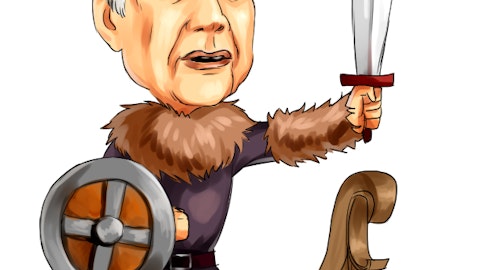According to its most recent Schedule 13D filing, Ralph Whitworth’s Relational Investors owns nearly 17.70 million shares of Magnum Hunter Resources Corp. (NYSE:MHR), representing 8.50% of Magnum’s outstanding shares of common stock. Relational Investors has submitted a couple of 13D filings with the SEC since its most recent 13F filing, all of which disclose a gradual reduction of the fund’s position in the independent oil and gas company (read more details). The hedge fund has reduced its stake in Magnum by another 4.19 million shares since its previous 13D filing, and by about 12.53 million shares since March 31, the period of report of its most recently filed 13F. It should be noted however that Relational is in the process of liquidating the entirety of its holdings by the end of 2015 and relaunching under new management, with the intent to take up many of the same positions at that time. The move to liquidate comes amid the health woes of Whitworth, who suffered a re-occurrence of throat cancer last year.

Most investors can’t outperform the stock market by individually picking stocks because stock returns aren’t evenly distributed. A randomly picked stock has only a 35% to 45% chance (depending on the investment horizon) to outperform the market. There are a few exceptions, one of which is when it comes to purchases made by corporate insiders. Academic research has shown that certain insider purchases historically outperformed the market by an average of seven percentage points per year. This effect is more pronounced in small-cap stocks. Another exception is the small-cap stock picks of hedge funds. Our research has shown that the 15 most popular small-cap stocks among hedge funds outperformed the market by nearly a percentage point per month between 1999 and 2012. We have been forward testing the performance of these stock picks since the end of August 2012 and they have returned more than 135% over the ensuing 34 months, outperforming the S&P 500 Index by nearly 80 percentage points (read the details here). The trick is focusing only on the best small-cap stock picks of funds, not their large-cap stock picks which are extensively covered by analysts and followed by almost everybody.
Follow Ralph V. Whitworth's Relational Investors
Relational Investors LLC, which is one of the oldest and most successful activist hedge funds, was co-founded by Ralph V. Whitworth in 1996. Although Relational Investors is an activist firm, Whitworth avoids the public “fights” with CEOs preferred by some of his peers, including Carl Icahn and Nelson Peltz. Instead, the Founder, Principal and Investment Committee member of Relational Investors attempts to work and cooperate with the management of the companies he invests in to make reforms by concentrating on ill-conceived decisions by board members. Relational Investors has roughly $6 billion in assets under management and primarily invests in publicly-traded companies on the North American continent through two funds: the Relational Investors Fund, which mainly invests in large-cap stocks, and the Mid-Cap Fund, which invests in mid-cap stocks. According to its most recent 13F filing, the San Diego-based activist firm manages a public equity portfolio worth $2.38 billion.
Magnum Hunter Resources Corp. (NYSE:MHR) is an independent oil and gas company that is mainly engaged in the exploration for and the exploitation, acquisition, development and production of natural gas and natural gas liquids resources in the United States. Specifically, the company focuses its operations on two of the most productive unconventional shale resource plays in the United States: the Marcellus Shale and the Utica Shale, plays that are located in the Appalachian Basin. The shares of Magnum have decreased by over 48% year-to-date. However, the stock achieved a short-term turnaround at the end of June as Magnum announced its intention to sell its entire equity ownership interest in Eureka Hunter, making it seem like Whitworth had perhaps discarded a chunk of his position in Magnum too early (read more details). However, shares quickly gave back most of the gains from that transaction. The company expects to generate roughly $600-$700 million in gross proceeds based on the existing market conditions. Hence, by divesting its 45.53% stake in Eureka Hunter, Magnum will undoubtedly improve its liquidity position and strengthen its balance sheet upon the completion of the divestiture.
Magnum Hunter had to raise $65 million by July 10, which was a new deadline set by its lenders. The company managed to raise $55.6 million through the newly-agreed deadline, including $33.6 million from the sell-off of 5,200 acres of undeveloped acreage in Tyler County, West Virginia. However, Magnum Hunter announced last week that it received a commitment from the Bank of Montreal to amend its senior secured revolving credit facility. The amendments eliminated Magnum’s obligations to raise the above-mentioned figure of $65 million in net cash proceed by July 10. The Chairman of the Board and Chief Executive Officer of Magnum Hunter, Gary C. Evans, claimed that the new amendment under the company’s existing senior bank loan facility offers Magnum the freedom and flexibility to pursue its plans of boosting the company’s liquidity without pressure from the short-term mandated requirements.
Magnum Hunter Resources Corp. (NYSE:MHR) had long-term debt of $941 million and $13.7 million in cash and equivalents as of March 31. Thus, the company intends to pay down $300 million to $400 million in debt with the sale’s proceeds, which will surely restructure and enhance Magnum’s balance sheet. As a result, the independent oil and gas company will be able to continue exploiting its vast Appalachian lease acreage position. Even more to that, the company intends to form two new joint ventures, one in Ohio and the second one in West Virginia, which will certainly boost Magnum’s activities in those regions. Therefore, it seems that the company will stop struggling under the weight of its debt and will embark on a growth journey soon enough. The sooner the sale of Magnum’s entire equity ownership interest in Eureka Hunter is completed, which could do wonders for the company’s balance sheet, the sooner its future prospects will improve. Within our database, Todd J. Kantor’s Encompass Capital Advisors represents the second-largest shareholder in Magnum Hunter Resources Corp. (NYSE:MHR) after Whitworth’s fund, owning 5.37 million shares.
Disclosure: None



